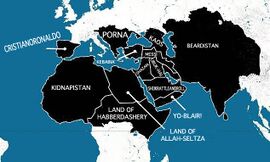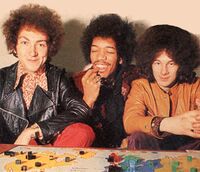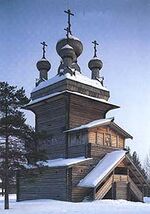Caliphate
Islamic Caliphate | |
|---|---|
| Motto: Have we got a secure connection to our Twitter account? | |
| Anthem: Guns & Humvees | |
 | |
| Official language(s) | Arabic, Cockney English, Rap |
| Government | Religious dictatorship |
| ‑ Caliph | To Be Determined |
| ‑ Vice-Caliph | To Be Determined |
| National hero(es) | Sepp Blatter |
| Major exports | Tourist terrorism, YouTube horror videos |
| Major imports | Beards, slaves, bullets |
A caliphate is the idea, gaining currency in the Middle East, that it would be even better than having 57 piss-ant countries that cover their women head-to-toe and stop working five times a day to check their compasses and engage in group prayers, to instead have one huge-mothah-country, stretching from Africa to Indonesia, with colonies in London and in American ghettos and prisons, that does the same thing. The Caliphate thus unites the three most evil groups in history: Al Qaeda, the Baath Party and Londoners.
The caliphate would be ruled by a caliph, much as phosphates drunk at soda fountains in upstate Michigan are ruled by a phosph. The caliph would essentially be the dictator of the Muslim world. However, he would be the most holy of clerics, and definitely not the result of politics, assassination, and treachery. His official duties would be limited to interpreting the Koran; also, to chopping off the limbs of persons with different interpretations.[1]
Experts believe that Islam's current infatuation with restoring the ancient caliphate is somewhat less dangerous than having Vladimir Putin reassemble the old Soviet Union, though we may still get 'two for the price of one.'
History
The first caliph was Abu Bakr, known in the U.S. Air Force as 'Able Baker.' When Mohammed died in 632, the Muslim leadership chose him over the prophet's son-in-law Ali and his daughter Fatima, a well known javelin-thrower.
Bakr didn't last long and was replaced in 634 by Omar. He saw the job as a combination of pope and emperor and under Omar, Islam swept out of Arabia and conquered Iraq, Palestine, Jordan, Syria, Lebanon, Egypt, and Iran. Omar was said to be merciful — unless you made him wake up too early on a Saturday. One day, no one could, which meant he was dead.
Uthman, a consolidator (in the non-Wall Street sense), set out to enjoy the fresh figs of the huge empire conquered in Mohammed's name. This upset certain purists, who called Uthman a backslider. He was assassinated by a religious fanatic who claimed Islam's message had been corrupted by Judaic-Christian-Zorastarian-Feminism.
Ali then became caliph, and it seemed the job would stay in the family, until Ali was killed in 661, by an assassin upset by the previous assassination. This led to the split of Islam into rival factions, named 'Sonny' and 'Cher' (no Shiite!) — which explains why their child had a gender transfer some years later.
So, within less than 30 years, two out of four caliphs had come to a premature meeting with their deity (pbuh). But there were a ton of other caliphs to follow, sometimes several at a time. In the 10th Century, the Muslim world had more people calling themselves caliphs than Big Time Wrestling had champions in the 20th Century. Islam suddenly had an Enlarged Apostate — and the 'little purple pill' would not be invented for nearly a millennium. Caliphs in those days had to defend their titles against each pretender, although they preferred to leave the fighting part of their job to generals whilst staying in their palaces and well-stocked harems, engaged in other activities (mostly, eating raisins).
The Mongols killed the last independent caliph in 1258, after which the job was carried on by shadowy figures living off generous pensions until the Ottoman Turks combined the titles of caliph and sultan and thus invented the practise of pension 'double-dipping,' enjoying an undisclosed income. The last caliph, Abdülmecid II, was deposed and exiled by Kemal Ataturk in 1924, and that should have been that.
Resurgence

In the latter half of the 20th Century, there have been more Muslim Heads of State reminiscing about the 'good old days' of the caliphate than Germans pining for the days when Hitler made the trains run on time. There is hardly a national leader who, after putting down internal insurrections and assassination attempts, does not dream of turning Arabia into a giant game of Risk, and envisage his countrymen as small lacquered blocks waiting to be post-moved across border lines.
Notorious caliphate wannabes included:
- Ayatollah Rubella Khomeini's personal brush with international notoriety culminated in the 444-day stand-off against U.S. President Jimmy Carter. This hostage crisis is known in Iran as تسخیر لانه جاسوسی امریکا, or 'Fifty-two pickup,' after the number of hostages involved. The American electorate sent in the cavalry, the White House was liberated as well as the hostages, and the episode ensured that the Ayatollah's dominance thereafter would be exclusively domestic, and that Carter likewise would be found solely at small home construction sites.
- Muammar Gaddafi, a man with twelve children and twelve hundred spellings, was an arms trafficker with caliphate-wide ambitions, until they met those of Ronald Reagan, culminating in the world's last bombing run in which collateral damage actually got airmen promoted. Gaddafi was America's bitch for the next two decades.
- Saddam Hussein took the next big step toward caliphate, an innocuous extension of the national domain into neighboring Kuwait. Unfortunately, the beachfront wasteland was a protectorate of the Bush family, and the random death threat — right when various Bushes were groping for their presidencies to have a 'theme' — did not help. Dabbling in anthrax was a contributing factor, though it was technically not a Weapon of Mass Destruction, as Saddam never figured out how to get it deployed when he commanded (except once against the Kurds), nor get it not deployed against himself. At any rate, he eventually lost his head entirely.
After Saddam, the task of reuniting the Muslim world into a single, squalid state fell to shadowy terrorist groups.
- al-Qaeda ('the Base') was the first. Chiefly rich Saudi college students, it never figured out how to 'stand up' a pan-Arabic state. However, it did figure out how to 'knock over' several tall buildings, delivering the sought-after theme to a Bush presidency. The terrorist act attracted megatonnes of explosive to places termed the theatre. Charismatic leader Osama Bin Laden went into hiding (fatefully, not deep enough into hiding), was secretly captured in Pakistan, and was even more secretly disposed of in the Indian Ocean, so that a U.S. President with a suspiciously similar name could take a 'victory lap' lasting three or four years and avoid whipping up the Muslim world into an anti-U.S. frenzy.
- Which then happened anyway. After the decimation of al-Qaeda, the caliphate's strategy was a change of name and a short wait for the President to return to fundraising and golf. The U.S. Army darted out of the 'theatre' as though someone had yelled 'Fire!' — on a date designed to ensure stability and just happening to coincide with a national election. The agreement to leave a 'training' force behind fell through, as the Iraqis made absurd demands, such as that any new fast-food joints serve Halal food.
Aliases
To keep the West off-base, the caliphate issues press releases that never use the same letterhead twice. Khomeini himself went into hiding and changed his name to Khamenei to throw the West off his trail. The caliphate is alternately known as:
- ISIS (Islamic State in Iraq and Syria), which the CIA mistook for the Egyptian god Anubis (pbuh) and never equated with terrorism — all the more egregious considering that, in 1998, Bill Clinton stated that his own legacy would "depend on what the meaning of ISIS."
- ISIL (Islamic State In the Levant), which gave the CIA comparable bafflement, as the 'Levant' is not shown anywhere on globes or maps in the U.S. All they know about 'levant' is Ray Walston making ashtrays float in My Favorite Martian.
- ICU2 (I See You Too), which gave the CIA complete conniptions, such as whenever one of their spies saw it on a car's vanity plates on the Beltway near Langley.
The group's occasional reference to the 'caliphate' itself gave the CIA equal bafflement, as few of those remaining in the 'intelligence' community actually studied history.
Experts state that the difference between ISIS and ISIL is that ISIS describes everything they have (Iraq and Syria), while ISIL describes everything they want (Iraq and Syria, and Israel, Northern Africa, the Near East, New York City, and the synagogue district of Skokie, Illinois). Also Italy, because they fancy Italian ISIS. The reason Obama refers to them as ISIL may be the stock American strategy against terrorism: Take all you want — then we'll talk.
More aliases
The Khorasan, founded by former heterosexual New Jersey governor Jon Khorasan, is a terrorist group that is reportedly even worse than ISIS/ISIL in terms of rapes and beheadings. The group is led by former Philippine First Lady Khorasan Aquino, who fancies a 'yellow revolution' for Arabia, which should be easy to accomplish as most Arab civilians have already pissed themselves in fear. The Khorasan only emerges — requiring a muscular response by a steel-jawed U.S. President — a few weeks before U.S. elections.
Boko Haram, by comparison, is partial to girls at boarding schools, and does not care whether they are A Whiter Shade of Pale.
Splinter groups of each of the above exist, and each is obliged to perform some number of beheadings to establish its Koranic bona fides. In nations such as Alegria, these groups can take advantage of tourism subsidies, under programs that aspire to replace Mecca as the destination for future hajjes and thereby pay back their cost.
Reactions
Caliphate, the board game
The CIA's computer science professionals use simulation to determine the likely effects of a number of different approaches to the resurgent caliphate. Conflicts are 'played out' under a variety of different assumptions.
It is no longer necessary to play them out one at a time; rather, computers play them a thousand times in a row to report the probability of each outcome. This means that spies like Joe Wilson and Valerie Plame do not have to tediously roll dice. They can smoke pipes and read foreign newspapers, as they normally do, to tell the President what is going to happen tomorrow (unless something else happens instead).
Nevertheless, the simulations are all based on the board game Risk, with several new rules added to it to better resemble real life:
- Each player gets crayons to draw red lines on the playing board which, when an adversary steps across them, nothing happens.
- Under the 'embargo' scenario, if an adversary gets too powerful, the lights in the room are turned out, in order to make it difficult for the adversary to do anything.
- When a territory is conquered, the victor does not draw a card from the deck, but the vanquished personally hands him the card, because the caliphate will be easier to deal with if we sympathise with it and admit that the West is the true source of all Arabia's problems, and the fact that the West has so much petrol is the reason Arabia has so little although it is sitting on top of most of it.
In fact, there is a second deck, of guilt cards, and the caliphate is allowed to draw one any time that:
- It knocks over a country that you 'stood up,'
- It knocks over a country that was using weapons you provided,
- It knocks over a country using weapons you provided and it stole, or
- You hit one of its schoolyard playgrounds that doubles as a missile silo.
Many of the replays showed that the caliphate would succeed at reviving the Good Old Days of the Eighth Century. The CIA is working on different simulations that will produce more hopeful results, as no one is comfortable when the President's Chief of Staff has a frown on her face.
The caliphate and Russia
The caliphate also raised concerns in Russia, though the KGB took a different tack from the Americans' emphasis on Games Theory. The KGB first ensured that the Russian Orthodox Church was not studying the movement with the goal of forming a patriarchate with similar territorial aspirations.
The caliphate sees Russia not as an ally or a colony but as a counter-threat. For example, it is pointless to force all women to be covered head-to-toe in a place where nine-month-long winters have already done the job. Other strictures of Islam, such as frequent interruptions from work and being prohibited from making money off loans, were taken care of in the Gorbachev years.
Beheadings and YouTube
The caliphate had plied its trade for years, but in 2014, it set aside the pliers and took up a chainsaw, for use on the necks of two American journalists and two British aid workers engaged in Vaccine Imperialism,[2] documenting their deeds on YouTube.
Former Secretary of State Hillary Clinton had emphasised the role of hurtful videos in inducing peasants to riot in places like Benghazi and bring their shoulder-fired missile launchers with them. So it was no surprise that the caliphate used the same technique to taunt the West.

The only problematic piece of the puzzle was how to respond. It being, once again, the eve of a U.S. election, Obama opted for a muscular response, after a brief pause for some steel-jawed selfies — provided there were no American boots on the ground (pictured). The call went out for a broad international coalition that would let the U.S. 'lead from behind' — not the coalition of a mere 40 countries that had helped George W. Bush 'go it alone.' A temporary problem was that the only nations the U.S. had not snubbed recently were Russia and Iran, neither of which do errands for free. Another problem was that the first, eager volunteer was France. Yet another was that the U.S. Administration then attacked itself, on the question of whether it had just declared war, or not. Fortunately, skilled wordsmiths declared it was a 'very significant counterterrorism operation,' which would take its place alongside the Vietnam 'conflict' and the Korea 'police action.'
The United States, after courteously disclosing its intentions via the United Nations grapevine, dropped bombs on the Levant for several weeks. The effect of this is unclear, as it is hard to tell, after terrorists scamper away from a bomb site, whether they scamper back a few days later, if there are no boots on the ground; likewise to tell whether the bombs actually hit anything.
At the same time, America suffered a series of 'workplace incidents' involving beheadings. The events, in the Muslim hotbed of Oklahoma, were described by the media as 'bizarre coincidences.' The public was distracted, and Congress turned away from its war footing and drafted additional regulations to balance female employees' right to a 'non-threatening workplace' with Muslim employees' right to Freedom of Religion.
Several final solutions
Some supporters of the caliphate see it as a movement to encompass the entire world. Others see it culminating in a millennial, final dust-up that ends the entire world.
Ardent Islamists believe both approaches can be pursued equally. They imagine the final end of Christianity, a day the caliph drives a Toyota pick-up truck into the basilica of St. Peter's in Rome and recites the prayer that magically converts it into a mosque, in a global come-uppance to match the fall of Constantinople, the resulting toppling of the European Union likewise wiping away all grudges against the Roman Empire.
The rank-and-file holy warrior does not know which of these destinies he is pursuing — only that he is pursuing a 'no idolatry' brand of Islam, which unfortunately views skyscrapers in Western capitals as 'idols.'
Death of a Caliph
ISIS/ISIL's head chopper in chopping, Abū Bakr al-Baghdadi (also 'Caliph Ibrahim') showed that there was only way to heaven/hell. He died blowing himself up like a suicide bomber when cornered by American Special Forces in Syria in October 2019. The Americans say everything was collected up after and dumped at sea. Like Bin Laden, Abū Bakr al-Baghdadi has joined the fishes.
References
| Featured version: 31 October 2014 | |
| This article has been featured on the main page. — You can vote for or nominate your favourite articles at Uncyclopedia:VFH. | |






